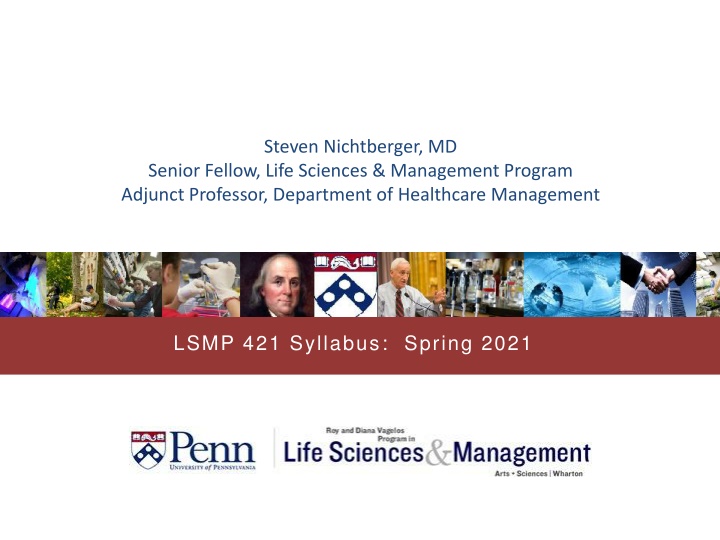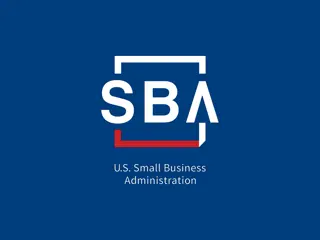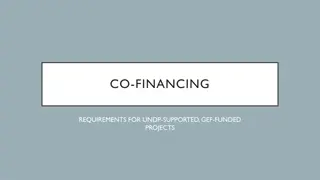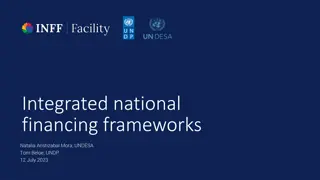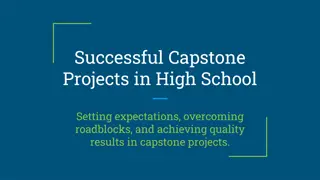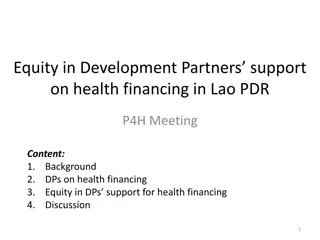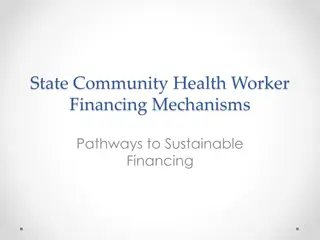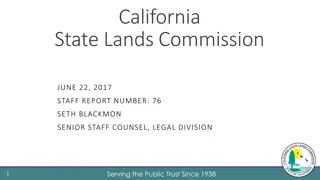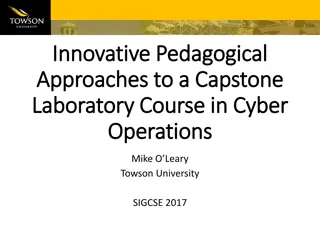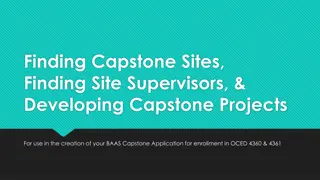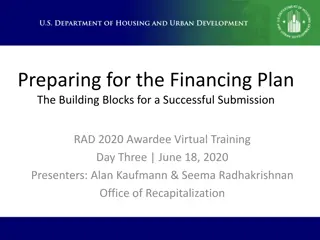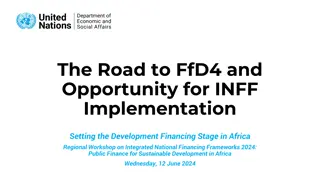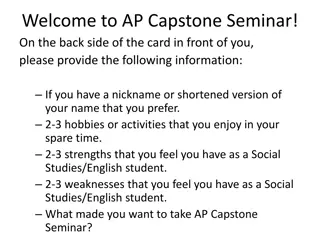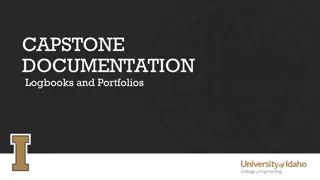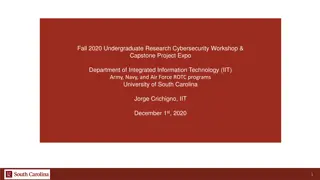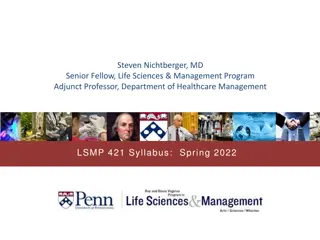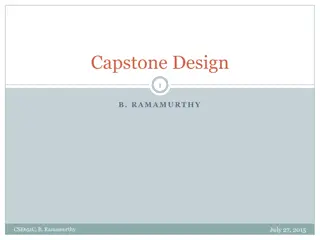Capstone Course LSMP 421 - Integrated Healthcare Financing Plan
In the Capstone Course LSMP 421, students develop and present an integrated plan to finance a healthcare advance, understand leadership, teamwork, and the impact of systemic racism on healthcare inequities. The course emphasizes experiential and practical learning through team collaboration, diverse mentorship, and guidance from industry experts. Expectations include a substantial workload, experiential learning, consultations with experts, and addressing conflicting feedback. Leadership and teamwork behaviors such as honesty, trust, and vulnerability are essential for success.
Download Presentation

Please find below an Image/Link to download the presentation.
The content on the website is provided AS IS for your information and personal use only. It may not be sold, licensed, or shared on other websites without obtaining consent from the author.If you encounter any issues during the download, it is possible that the publisher has removed the file from their server.
You are allowed to download the files provided on this website for personal or commercial use, subject to the condition that they are used lawfully. All files are the property of their respective owners.
The content on the website is provided AS IS for your information and personal use only. It may not be sold, licensed, or shared on other websites without obtaining consent from the author.
E N D
Presentation Transcript
Steven Nichtberger, MD Senior Fellow, Life Sciences & Management Program Adjunct Professor, Department of Healthcare Management LSMP 421 Syllabus: Spring 2021
Capstone Course LSMP 421 Vision Integration of business and science Transition from academic to real world Objectives 1. 2. 3. Develop & present integrated plan to finance a healthcare advance Understand and develop individual leadership / teamwork behaviors Understand systemic racism impact on healthcare inequities Experiential and Practical Learning Process Groups of 5 students each form a management team o team diversity, trust, and transparency are key to success o select an opportunity that you can get excited about o develop and present an integrated plan to gain financing
Organization and Staffing Course Director: Steven Nichtberger, MD Assistant Course Director: Joan Lau, PhD Guest Lecturers: Leaders from healthcare industry Four teams, with substantial support: o TAs focused on leadership and teamwork Hannah Williams, Anjali Bhatla, Graham Attipoe, Jonathan Kern o Mentors LSM grads to guide on process Daniel Lundgren, Jack Yoo, Juliet Solit, Serena Advani o Scientific founders Founding scientists for each team o Board of Advisors Diverse group of experts offering continuity and advice to each team o Strategic and functional advisors Dozens of pharma and biotech executives o VC, public investor, banker, and analyst advisors 5AM, NEA, Adage, Bain, Cowen, JPM, Centerview
Approach Synchronous Online Interactive presentations o All student videos must be active throughout class sessions Team breakouts Lectures By accomplished experts in each functional area o preclinical o clinical o regulatory o marketing o finance o banking o investing o partnering Team meetings immediately following lectures with experts rotating additional team meetings each week as needed
Setting Expectations Substantial workload, but you get out of the class what you put into it Experiential learning with abundant resources to support teams Consultations with experts and advisors will be essential o networking is key to success Feedback may be conflicting as in the real world o teams will need to determine how to proceed Leadership / teamwork behaviors be honest, trusting, and vulnerable o 1st semester understand expectations, self-assessment, 360 feedback o 2nd semester 360 feedback and coaching o Process Individual emails to TAs from team members throughout the year Team 360 meetings with update to TA s 1:1 meetings in October and March with TAs and course director Speakers to address systemic racism impact and healthcare inequities Learning process is iterative o Need to optimize and align strategic choices among functional areas
Course Objectives (1 of 2) Develop and present integrated plan to finance a healthcare advance 1. Understand scientific basis of product critically review literature 2. Evaluate and understand clinical unmet need that product could fill 3. Identify key attributes of product that can deliver relevant clinical advance 4. Write target product profile, clinical indication, draft development strategies Oct 5. Evaluate the market opportunity and make strategic choices 6. Evaluate pricing and reimbursement challenges and and key success factors 7. Create transparent assumption-based revenue projections (US and ex-US) Nov 8. Create a sound development strategy (preclinical and clinical) 9. Create a detailed clinical development plan for each regulatory phase 10.Create a complete financial model and develop pro forma with key sensitivities Feb 11.Create a milestone based operating plan that links directly with optimal 12.Develop recommended financing plan to minimize the cost of capital 13.Develop time-based valuation and evaluate exit opportunities for investors April
Course Objectives (2 of 2) Understand and develop individual leadership / teamwork behaviors Coaching throughout semester o TA s are your direct manager Will attend Friday team meetings, other team meetings as needed, and will collect email impressions from each student on a regular basis. Will meet with each of you individually each semester to discuss leadership and teamwork behaviors to provide feedback and guidance o My office hours by appointment nichs@wharton.upenn.edu In addition to encouraging you to schedule a meeting anytime, each student will schedule a 1:1 with me after your 1:1 meetings with your TA in each semester to discuss leadership and teamwork behaviors o Joan Lau, PhD, assistant course director Available to provide advice and guidance, meets with team as needed jlau@wharton.upenn.edu
Course Overview January o 22 Steven Nichtberger, MD Overview of semester; IPO process and roadshow presentation Assignment: Collection and submission of all references / articles by 1/28 o 29 Eric Schmidt, CFO, Allogene Umer Raffat, Senior Biotech Analyst, Evercore/ISI CFO role, models, planning, and interactions with bankers and analysts Analyst valuation of early-stage biotech including pro-forma modeling Group discussion
Course Overview February o 5 Sara Nayeem, MD, Partner, NEA Venture investor s perspective, approach to valuation Team discussions o 10 Assignment Due: 2 page summary before 5pm Technology, unmet need, clinical / regulatory plans, marketing choices; P&L Detailed review of development plans, budgets, and revenue forecasts Meetings will be scheduled to review with each team o 12 No class (Penn day off) o 19 - Adam Koppel, MD PhD, Managing Partner, Bain Life Sciences - Rick Solit, MD, Partner, Adage Capital Public investor s perspective on early-stage biotech companies Approach to valuation of a public healthcare company o 24 1:1 meetings with Professor TA s schedule 1:1 s week of February 15th for each student o 26 - Phil Ross, MD, Vice Chairman Healthcare Banking, JP Morgan - Henry Gosebruch, Chief Strategy Officer, AbbVie Biotech IPOs; What needs to be true to succeed? Trends and expectations Strategic partner perspective, mergers & acquisitions Venture investing by strategic partners
Course Overview March o 5 - Team Presentations Full presentation including detailed development/operating plans & financials o Not yet including financing strategy or potential exits 25 minutes each followed by 15 minutes each Q&A Final PPT presentations due March 1st 5pm o 12 Diversity, Equity and Inclusion Steven / Joan Team Cross Fertilization Meetings o 19 Jennifer Taubert, Company Group Chairman, JNJ Equity Inclusion and Diversity in the healthcare eco-system Progress and challenges for women and under-represented groups in healthcare o 26 Roy Vagelos MD, PhD (via video preview - live Q&A (2pm-3:30pm) One life well-lived, billions impacted
Course Overview April o 2 Leadership and Teamwork Class debriefing o 9 mRNA and COVID-19 vaccines academics changing the world Drew Weissman, MD, PhD Prof Medicine Penn / co-inventor mRNA LNP vaccine Paul Offit, MD Prof Pediatrics, CHOP / inventor rotavirus vaccine / FDA advisor o 16 Dry run final team presentations (2pm to 6pm) 50 min per team live presentation for 30 min, live Q&A 20 min o 30 min presentation (due on April 12th at 5pm) o Jeremy will print copies for all attendees o 20 min questions/discussion - LSM alumni reviewers o 23 Final team presentations (9am to noon) Final PPT and all excel models due April 19th at 5pm Final presentation video due April 19th (30 min) at 5pm LIVE 30 min Q&A assuming audience has viewed video during week
Capstone Course LSMP 421 Grading Team Presentations 66% o Quality of preparation and evaluation o Persuasiveness of presentation in support of strategic choices o Clarity and efficiency of presentation Individual Leadership / Teamwork Behaviors 34% o Primary questions: Does the student: always put the team first? proactively seek and constructively respond to feedback? o Four dimensions of emotional intelligence o Self awareness o Self control o Team awareness o Team influence
Capstone Course LSMP 421 Additional logistics (1 of 2) Team presentations o Empowered leaders on teams for each functional area Expect team engagement and collaboration in each functional area o Presenters may be assigned by professor prior to presentations Background reading and pre-class preparation o Reference materials and backgrounders will be provided as needed o If reading is required, invited speakers will expect you come prepared Projects and products sourced from Penn Medicine and worldwide o Non-disclosure / IP ownership agreements must be signed by all Class attendance required unless specific exception approved in advance o Required to e-mail director in advance if absence unavoidable o Impact on team dynamics and grade Canvas Video o All classes recorded, including team presentations
A note on diversity, inclusion, and wellness It is important in preparing students for careers in the life sciences and management that they have a sense of belonging to a common community. If this is to be accomplished, all students in this course, as well as the staff and faculty, must work together to create a supportive, inclusive environment that makes provision for all regardless of race, gender identity, sexuality, or socioeconomic status. Since diversity, inclusion, and belonging are the course s core values, all involved deserve and should expect to be treated with respect by other members of the community. If you think you have been harmed or for one reason or another feel uncomfortable or unsafe and would like to speak with someone confidentially or report an incident, click here for a list of the resources available. If you have been involved in an incident of bias, either as a harmed party or as a witness, and you would like to make a report, you can do so using a Bias Incident Reporting Form. Please note that you can always reach out to any of your primary instructors for this course who will help you navigate the system to connect you with the support that best meets your needs. Questions?
